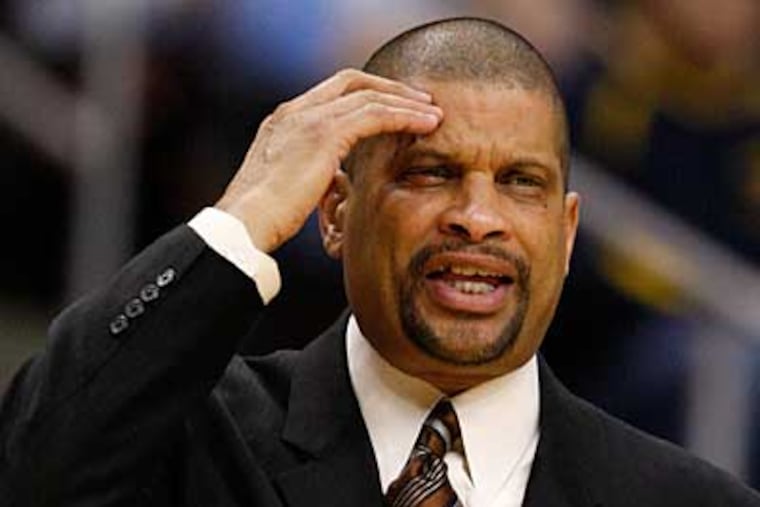Inside the Sixers: Sixers plunge to new defensive depths
We know the 76ers are practicing behind the curtain. We hear balls bouncing. Afterward, we see sweat dripping. For the final few minutes, we even watch, glued to the glass windows in the gym at the Philadelphia College of Osteopathic Medicine.

We know the 76ers are practicing behind the curtain.
We hear balls bouncing. Afterward, we see sweat dripping. For the final few minutes, we even watch, glued to the glass windows in the gym at the Philadelphia College of Osteopathic Medicine.
Now, exactly what the Sixers are practicing remains an A-list mystery.
For example, it would come as quite a surprise if they spent hours a day diving into the intricacies of perimeter defense, defensive rotations, and closing out on outside shooters.
Why?
Because through 23 games, the Sixers are on pace to become the worst perimeter defensive team in NBA history - this according to the numbers, which can be twisted, of course, but never lie outright.
If you're the coach of these Sixers, and that distinction belongs to Eddie Jordan, you're probably not including this statistical nugget on your holiday greeting card to general manager Ed Stefanski.
Through 23 games, the Sixers are allowing 101.3 points a game; opponents have made 186 three-pointers at a rate of 41.3 percent.
The record for highest opponent three-point percentage belongs to last season's Sacramento Kings - winners of 17 games, losers of 65 - who allowed 40.6 percent.
The Sixers are on pace to give up 663 three-pointers for the season, which would be the third-most in NBA history. Before Wednesday night, when the Detroit Pistons shot 1 for 8 from the three-point line, the Sixers were on pace to give up 691 three-pointers, which would be tops in NBA history.
The record for most three-pointers allowed in a season belongs to the 2007-08 Washington Wizards, who allowed 683. The second-place spot belongs to the 2008-09 Wizards, who allowed 674 three-pointers. Jordan coached the Wizards from 2003 to November 2008.
Last season, the Sixers allowed 92.1 points per game, 9.5 points per game fewer than they currently allow.
These numbers are only hard evidence for what fans have deduced from watching: This team has gone from a solid defensive team - although never great at stopping the three - to a bad defensive team that can't stop the three.
Plus - and this is a kicker - the Sixers can't score, resulting in a disturbing combination of bad offense and bad defense. The Sixers average 96.2 points a game, 24th of 30 NBA teams. Of those bottom eight scoring teams, the only one also surrendering more than 100 points a game is the Minnesota Timberwolves.
Minnesota is 3-20, at the bottom of the Western Conference - bad company to be keeping.
How did this happen?
The first answer that springs to mind is the Princeton offense: That thing casts a mighty wide shadow and gobbles an awful lot of practice time. The second answer is that Jordan, never known as a defensive coach, has seemed particularly overcommitted to the offensive side. The third is the rotations, which tend to exclude the team's best defenders and are often, at the end of games, much smaller than the opponent's.
No move better represents this defense-second mentality than the addition of point guard Allen Iverson. The day Iverson signed, one NBA general manager relayed the following via text message: "And exactly how will the addition of Iverson help the league's 23rd worst defensive team?"
It won't. But that isn't, and has never been, the primary concern.
Since Iverson's arrival, Jordan has said he will switch his team into a matchup zone to save Iverson's legs. A matchup zone isn't an aggressive defense, it's a defense in which you hop around as if you're doing jumping jacks and then eventually give up an open three-pointer. Jordan has also said that when point guard Lou Williams returns from his jaw injury, he would like to start a backcourt of Iverson and Williams because they would be a "high-scoring" combo.
They would be. They'd also be the smallest starting backcourt in the NBA, neither guy known for his lockdown defense.
In the opening game of the season, the Orlando Magic made 16 three-pointers, blowing out the Sixers. At that time, Jordan said the perimeter defense was not yet a concern: It was one game, they made some tough shots. Give credit to the Magic.
Since then, there has been a lot of credit doled out: to the Magic, the Boston Celtics, the Phoenix Suns, and the Utah Jazz.
Jordan said after that first game that if it became a pattern, if it was still a concern after 15 or 20 games, then it would be addressed.
Now, Jordan says, "We have to get better."
Sixers fans, however many are left, would appreciate it.
Inside the Sixers:
Read Kate Fagan's 76ers blog, Deep Sixer, at http://go.philly.com/sports.
Blog response of the week
Posted by: chuckw, 3:55 p.m. Thursday
Subject: Rotation, rotation, rotation
In order to become a more defensive-minded team, the Sixers would need a defensive-minded coach. To some extent, I feel sorry for Jordan, master of the Princeton offense; the signing of Iverson completely screws up whatever rotation and offensive system he was putting into place (although many of us were not certain of either the rotation or system), as he knows he must start Iverson and play him lengthy minutes, whether he plays well or not. As much as Willie Green gets roasted by posters (including yours truly), he was actually playing well as a starter and now sees few minutes, while Carney is now a DNPCD [did not play, coach's decision] and Jrue Holiday seems to be permanently injured! Hmm!!
EndText